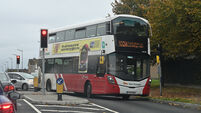The more things change...
Looking across a time span of 30 years, it is remarkable how little things have changed on the political landscape as evidenced by revelations contained in State papers now coming to light for the first time.
This universal observation has particular relevance for the unchanging personality of Ian Paisley, the North’s most bigoted politician and a man the Irish and British governments are finding just as difficult to deal with today as they did in the early 1970s.
Three decades ago Paisley was seen as one of the North’s biggest problems. In the succinct words of then British Prime Minister Ted Heath “Paisley was an extremely shrewd operator” who “made allegations and statements which could be without foundation but he could never be caught up with afterwards”.
At the time, the British kept him out of talks on a power-sharing executive because they were anxious to make prompt progress on the broader issue of an all-Irish dimension. How well-advised they were.
In those turbulent times, any political observer worth his salt could see the explosive dimension of the Paisley time bomb. But what few could have anticipated were his survival qualities or the electoral appeal of such a blatantly biased politician.
Epitomising the negativity and sectarianism of Northern politics, the Paisley factor has not only endured but blossomed to the point where he has now assumed outright leadership of hard-line unionism.
More than ever, as leader of the North’s biggest party, he is the primary figure Taoiseach Bertie Ahern and British Prime Minister Tony will have to deal with as they strive to salvage what remains of the Good Friday Agreement.
With the accord on a knife edge, the major challenge facing the two leaders will be to rebuild trust between unionists and nationalists in the aftermath of the sweeping electoral performance by the DUP and Sinn Féin.
How to resolve this difficulty will, hopefully, become clearer after today’s deadline for rival parties to submit ideas on ways of improving the workings of the peace deal.
In terms of realpolitik, the emergence of Ian Paisley and Gerry Adams as the dominant figures on the North’s political stage is something the two governments know they will have to take on board as they search for measures to inject new life into the sorely wounded power-sharing doctrine and also of putting the implementation of the peace agreement back on track.
As acknowledged by the Taoiseach, the results of the election are the will of the people. Like it or not, it is painfully clear that the more rational voice of nationalism will diminish as the fortunes of the SDLP decline. Equally, the uncertain face of middle ground unionism will become less clear with the diminution of the UUP.
However unpalatable people find the bigoted politics of Paisley or the extreme nationalism of Adams, they symbolise the yawning gulf between the North’s divided communities.
Nevertheless, with their new political mandates come major responsibilities. After 30 years, the fundamental challenge facing the North’s politicians will to break the mould in 2004 and finally deliver a working and enduring political Assembly for all the people.





